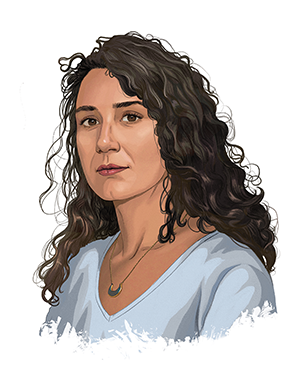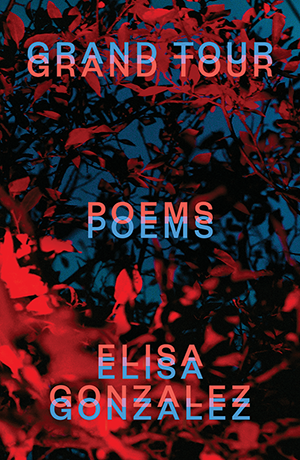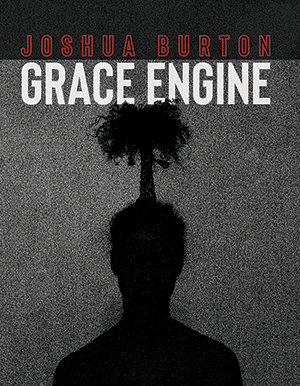Elisa Gonzalez
Grand Tour
Farrar, Straus and Giroux
My hair tangles her fingers
till I unknot it, and I unknot it
as I’ve done many things
to detach myself
from pleasure.
—from “Roman Triptych”
How it began: There are two answers: The first is that I got tired of waiting for perfection. For years I believed, even though I knew this wasn’t true, that I’d know I had a book when it was whole and smooth and undeniable. The second is that my youngest brother was shot to death in 2021, and while I was prepared not to write again—for a while permanent silence really seemed like a possibility, and I didn’t feel the possibility as a loss, simply an unavoidable change—after several months I felt a graphomaniacal impulse. From close contact with death, I felt keenly how little time there is. And if I wanted to write, I had to stop wasting time. Until then I’d been afraid to risk finishing, and failing, and then I recognized those fears as ridiculous and time for the scarce thing it is.
Inspiration: My poems are full of other voices, and I think of all those interlocutors—whether members of my family, or writers I’ve read, or works of art I’ve engaged with, or fragments of conversations between strangers I’ve overheard—as inspirations, because those textures and exchanges feel essential to how my thinking develops.
Influences: The artists I most admire in any genre are, in my opinion, inimitable. So I am not sure I can count them as influences on my work. But people whose work I’ve admired immensely, whether or not mine resembles theirs, include Tory Dent, Layli Long Soldier, Laura Riding, Marilyn Hacker, and Petrarch.
Writer’s block remedy: I recently heard the brilliant Australian writer Helen Garner say, and I’m paraphrasing here, that writing is just arranging words on a page. I find that kind of demystification helpful when I’m stuck. She wasn’t diminishing the difficulty, but as someone prone to melodrama, I find it helpful to yank my head and agonies away from the existential. Writing is both important and not important.
Also, sometimes I give myself assignments—write a poem with X word, write a poem imitating this other poem I like—so that I can play without applying pressure to the words. The burnout that comes from capitalist stressors—needing to finish a book so you can apply for a job, needing money, not having the time to write—that’s harder to reason away. Then I rely on friends, a mutual bearing up and making our way through.
Advice: If you can, ignore the pressure to publish sooner rather than later. Let your work evolve. Be disloyal; it’s all right to not publish everything you’ve ever written. Look for people with whom you feel some kinship, personal and perhaps also aesthetic. Find the bedrock that will keep you writing even without any external validation, because a life sustained by what you get from other sources—magazines, publishers, prizes, etc.—is a hollow life. And persist.
Finding time to write: I am fortunate that over the last few years I’ve had a fair amount of latitude to write what I wanted, when I wanted. From 2016 to 2018 I received an arts Fulbright, and that was the first time in my life I had the freedom to write as much as I wanted without worrying about money. Before that I was writing in little gaps and it was hard; sometimes you have to refuse things you want in order to gather those scraps of time.
Putting the book together: Since the poems span a long time, the obvious order seemed roughly chronological, moving from a more restricted world of childhood to a more expansive mental and physical territory. But that was boring, so I tried to bring a sense of disorder to the arrangement, a collage of times and places that would disorient and then, perhaps, cohere into a portrait of a whole life.
What’s next: I’ve written only a couple of poems since finishing the book and am waiting to see what the next phase of my poetic life will be. I would like to find new movements, new sounds, as I don’t want to repeat myself endlessly. I’m trying to be patient. I also have a novel and a nonfiction book under contract, so I have those to work on, and I’m writing some essays and short stories.
Age: 34.
Residence: Brooklyn, New York, though I try not to be in the city, or any single place, 100 percent of the time. For now, at least, I prefer to be a little unsettled.
Job: I freelance in various capacities. I write critical and long-form essays. I also edit and teach writing privately.
Time spent writing the book: I’ve written hundreds of poems since I began writing poetry seriously sixteen years ago and there are hundreds that may never see a book, including some that I think are good. When I started making this book, I first took stock of this mass creation. Then I culled. I included poems that I wrote in my first poetry workshop in college and poems that I wrote right before submitting the book.
Time spent finding a home for it: I waited so long—maybe too long—to both start and finish a book. When I was finally ready, I was very lucky to only submit the book to one publisher and to not wait long for an answer.
Recommendations for recent debut poetry collections: Judas Goat by Gabrielle Bates (Tin House); I Love Information by Courtney Bush (Milkweed Editions); Boomhouse by Summer J. Hart (The 3rd Thing); Couplets: A Love Story by Maggie Millner (Farrar, Straus and Giroux); Eggtooth by Jesse Nathan (Unbound Edition Press); God Themselves by Jae Nichelle (Andrews McMeel Publishing); and Have You Been Long Enough at Table by Leslie Sainz (Tin House).
Grand Tour by Elisa Gonzalez
![]()
Joshua Burton
Grace Engine
University of Wisconsin Press
The two men who think they will never die
are two opposing laws:
the will to live and the will to live a little longer.
—from “Grace Engine”
How it began: I dedicated my earlier chapbook, Fracture Anthology, to my mother. All the poems were about her, and many of them were even written in her voice. This exploration of her life meant a lot to me, but I’ve come to realize that in many ways I was able to avoid myself while writing that chapbook. I didn’t have to confront the things that move me or stop me. With Grace Engine, one of the missions I had was to center myself and be as vulnerable as possible so I couldn’t avoid any parts of myself.
Inspiration: The summer before starting Grace Engine, I decided to research the Black Panther Party and other Black liberation organizations as well as movements and activists. Engulfing myself in the lives of these people filled me with a tremendous amount of pride. After that summer I had time to sit with all I learned and try to understand how that pride conflicted with the anti-Blackness I had internalized over the years. That tension inspired Grace Engine.
Influences: During that same summer I read the work of Terrance Hayes religiously. It was one of the first times I was keenly aware of a Black writer writing directly to me. I felt heard by his work, like my experiences mattered and weren’t arbitrary. My connection to Toni Morrison’s Song of Solomon (Knopf, 1977) gave me similar feelings, and I honestly believe the writing she does in that book is the best writing I’ve read in any genre. Her brilliance and magic wowed me and inspired some of the choices I made in Grace Engine. That summer I discovered Ta-Nehisi Coates as well, not necessarily his writing but his interviews, and they were a great source of understanding for me in the ways that Blackness exists in these in-between spaces in the world, and how important it is for us to uncover and talk about the nuances of those spaces. Additionally, the poet Solmaz Sharif is certainly at the heart of Grace Engine. I met her briefly at a Tin House workshop when I was only a few poems into my collection and she gave me life changing feedback that truly dictated the direction the rest of the book went in. The version of Grace Engine that exists now would not be so without our meeting and her input.
Writer’s block remedy: Honestly, this is still something I am figuring out. I’m not easily inspired, yet anything has the potential to inspire me. When I decide I’m ready to create a new poem, I usually immerse myself in one or two poems that I’m obsessed with for one reason or another. After sitting with them for days or weeks, the poems tend to pull something out of me, sometimes a word, a sound, a rhythm, whatever it is that gives me the fuel I need to write again.
Advice: The most important aspect of creating and revising a book is your relationship with the poems, so don’t compromise that for any reason. Rejections will come, and they can be debilitating, but if you keep your relationship with the work strong, I believe the poems will find their home.
Finding time to write: I work as a full-time high school English teacher, so I don’t have much time. Also, because I can only write when the spark hits me, I make sure to take advantage of that feeling no matter where I’m at or how late it is. I will stay up on a work night to get out a draft before the feeling leaves me. In my mind the poem comes first, so I will always make time for it when it chooses to show itself to me.
Putting the book together: With Grace Engine, deciding what poems belonged in which section came easily to me. The book is split into two parts: “I” and “We.” My thought process was that the “I” poems were about me believing that I could work through trauma by centering myself. The “We” poems were about realizing that all of us were needed. Like Solmaz Sharif told me, those who are part of this us know who they are. I decentered myself to see how much more needed to be considered, especially since the trauma I’ve experienced in my life has existed before me and will be here after I am gone. I needed this collective us to hold me and to work with me in completing the book.
What’s next: A major question posed in my debut collection is, “How do we show grace best to the ones we love and those who have passed on?” The “Giving ____ Grace” poems in the book attempt to capture those different methods of showing grace. But one method that came to me near the end of writing this collection is the power of mythmaking to give us eternal life. I’m an atheist/agnostic, so I don’t believe in heaven or hell, but I have a strong desire to believe that we deserve something that stretches beyond our earthly bodies. Mythologizing us is the closest I’ve come to eternal life. I want to create myths for the people I love, my family and ancestors, for them to be able to exist outside of time and live on.
Age: 34.
Residence: Houston.
Job: I teach eleventh- and twelfth-grade English at a charter school, but I would like to teach at a university level.
Time spent writing the book: I started Grace Engine in the fall of 2017, and the book was picked up on January 1, 2022. I wrote a few more poems for the book after that and of course did some revising, but the bulk of the book was done by the time it was picked for publication.
Time spent finding a home for it: I was almost at the year mark and was getting rejected by a lot of my dream presses. It was getting to the point where my confidence was beginning to take a hit. The few places that listed the book as a finalist were the last presses I submitted to in that yearlong contest cycle, and one of the places I was a finalist for ended up publishing the book.
Recommendations for recent debut poetry collections: I’ve been happy to share my debut year with so many great poets. Anthony Sutton’s Particles of a Stranger Light (Veliz Books) is an amazing collection with a distinct and powerful voice behind each poem that inspires me tremendously. K. Iver’s Short Film Starring My Beloved’s Red Bronco (Milkweed Editions) is such a special book that masterfully balances grief, grace, and silence. Emily Lee Luan’s 回 / Return (Nightboat Books) has such a unique power over form that constantly left me in amazement of how her poems traveled. Karisma Price’s I’m Always So Serious (Sarabande Books) has a level of tenderness that left me awestruck. And Eugenia Leigh’s second poetry collection, Bianca (Four Way Books), which was also published in 2023, includes poems whose sharpness seems to cut you with an X-Acto knife; as she reveals more of herself, the reader starts to reveal more of themselves as well.
Grace Engine by Joshua Burton













